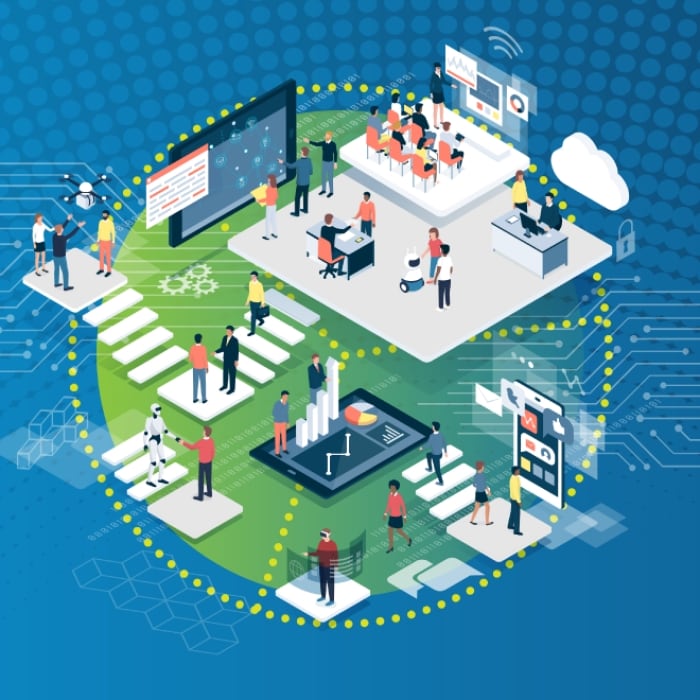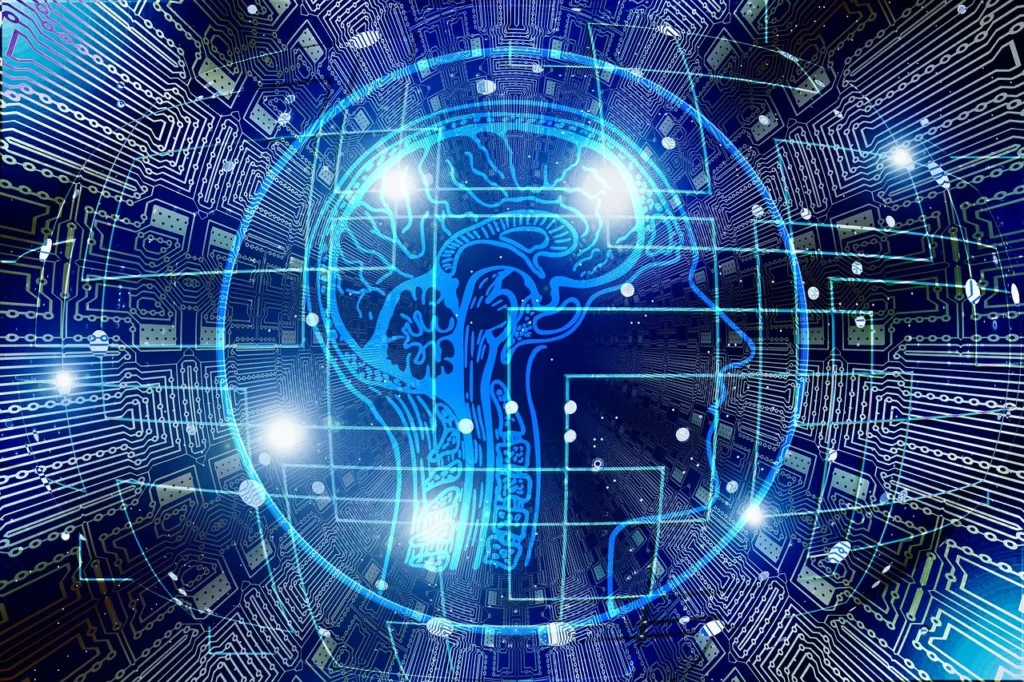So, you’ve heard the buzz about “Exploring the Future of Innovative Technology Jobs,” and you’re curious to know what it’s all about. Well, let us fill you in. This groundbreaking product is a comprehensive guide that takes you on a journey into the future of technology jobs, exploring the exciting advancements and opportunities that lie ahead. Whether you’re a tech enthusiast or someone looking to venture into the field, this resource will provide you with invaluable insights, expert advice, and a roadmap to navigate the ever-evolving landscape of innovative technology jobs. Get ready to unlock a world of possibilities and pave your way towards a rewarding and impactful career.
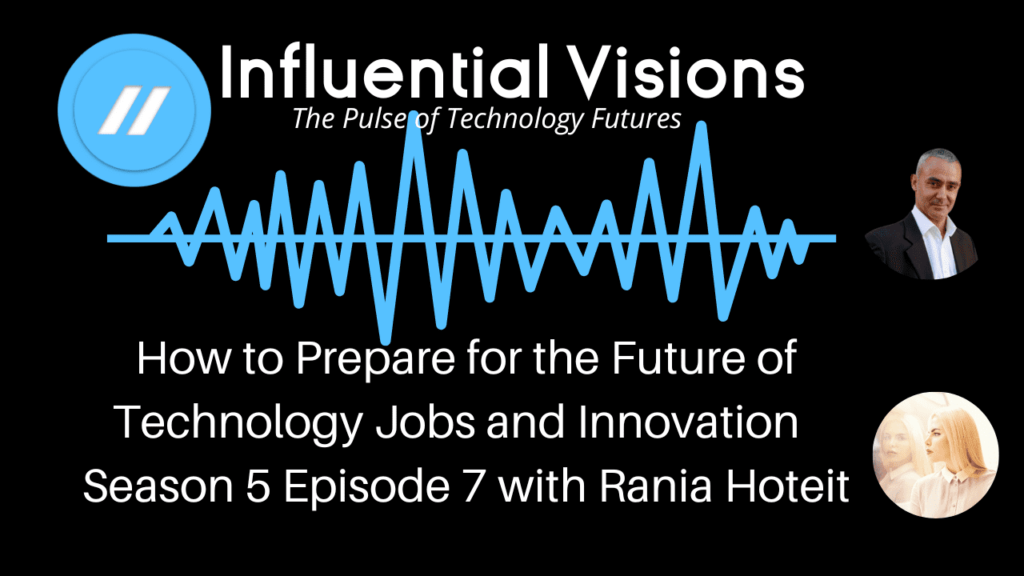
This image is property of legacymediahub.com.
Artificial Intelligence (AI) Jobs
AI Software Developer
As an AI Software Developer, you will play a crucial role in building and designing the software applications that make artificial intelligence possible. You will use your programming skills to develop algorithms and models that enable machines to learn and make intelligent decisions. This involves working with machine learning frameworks, programming languages like Python or Java, and leveraging large datasets to train AI models. AI Software Developers are in high demand across various industries, including healthcare, finance, and e-commerce.
Machine Learning Engineer
Machine Learning Engineers are responsible for creating and implementing complex algorithms that enable machines to learn and improve on their own. You will work with large datasets and utilize statistical models to develop algorithms that can identify patterns and make accurate predictions. Additionally, you will collaborate with cross-functional teams to deploy machine learning models into production systems. Being proficient in programming languages like Python, R, and Java, as well as having a strong background in mathematics and statistics, is essential for this role.
Data Scientist
As a Data Scientist, you will be responsible for extracting insights from vast amounts of data. You will utilize your analytical skills to uncover patterns, trends, and correlations that can drive business strategies and decision-making. Data Scientists often work with large datasets and employ advanced statistical techniques, data mining, and machine learning algorithms to extract valuable insights. Proficiency in programming languages like Python or R, as well as experience with data visualization tools, is highly valuable in this role.
Algorithm Specialist
Algorithm Specialists are experts in designing and optimizing algorithms for specific tasks or problems. They possess a strong understanding of mathematical concepts, optimization techniques, and computational complexity. Algorithm Specialists collaborate closely with software developers and data scientists to create efficient algorithms that solve complex problems. They play a vital role in improving the efficiency and performance of various systems, such as recommendation engines, image recognition algorithms, and natural language processing systems.
Virtual Reality (VR) and Augmented Reality (AR) Jobs
VR/AR Content Creator
As a VR/AR Content Creator, you will be responsible for designing and developing immersive virtual and augmented reality experiences. You will use a combination of artistic and technical skills to create 3D models, animations, and interactive environments. Collaboration with cross-functional teams, including designers, developers, and UX/UI specialists, is crucial to bring your vision to life. Proficiency in software tools like Unity or Unreal Engine, as well as knowledge of 3D modeling and animation, is essential for this role.
VR/AR Developer
VR/AR Developers are responsible for building the software applications that power virtual and augmented reality experiences. They utilize programming languages like C#, C++, or JavaScript to create interactive environments, implement user interfaces, and integrate hardware components. VR/AR Developers often work closely with designers and content creators to ensure a seamless user experience. Familiarity with VR/AR development platforms, such as Unity or Unreal Engine, and knowledge of 3D graphics programming are essential for this role.
VR/AR Designer
VR/AR Designers focus on creating visually appealing and user-friendly virtual and augmented reality experiences. They utilize design principles to develop intuitive user interfaces, captivating visual effects, and realistic 3D environments. Collaboration with developers and content creators is essential to ensure that the design aligns with the technical capabilities of the VR/AR platform. Proficiency in design software like Adobe Creative Suite, as well as a strong understanding of user experience (UX) principles, is crucial for success in this role.
VR/AR Ethicist
VR/AR Ethicists contribute to the ethical and responsible development and use of virtual and augmented reality technologies. They address ethical considerations related to privacy, data protection, psychological effects, and societal impact of VR/AR experiences. VR/AR Ethicists work closely with developers, designers, and policymakers to develop guidelines and frameworks for ethical VR/AR development. Analytical thinking, strong ethical reasoning, and familiarity with emerging ethical issues in technology are essential for this role.
Blockchain Jobs
Blockchain Developer
Blockchain Developers work on designing, developing, and implementing blockchain solutions. They utilize programming languages like Solidity, JavaScript, or Go to write smart contracts, develop decentralized applications (DApps), and create blockchain protocols. Proficiency in cryptography, understanding of consensus algorithms, and experience with blockchain platforms like Ethereum or Hyperledger are essential for success in this role. Blockchain Developers often collaborate with cross-functional teams to integrate blockchain technology into various industries, such as finance, supply chain management, and healthcare.
Blockchain Architect
Blockchain Architects are responsible for designing and overseeing the architecture of blockchain systems. They define the structure, components, and protocols of blockchain networks. Blockchain Architects work closely with developers, ensuring that the architecture aligns with the business requirements and scalability needs of the system. They possess a deep understanding of blockchain technology, cryptographic principles, and distributed systems. Proficiency in programming languages, knowledge of blockchain platforms, and experience with cloud computing are valuable skills for this role.
Blockchain Analyst
Blockchain Analysts analyze and interpret blockchain data to derive meaningful insights. They examine transactional data, address clusters, and network behavior to identify patterns, discover vulnerabilities, and enhance system performance. Blockchain Analysts work closely with developers and security experts to identify potential threats and weaknesses in blockchain networks. Proficiency in data analysis tools, knowledge of blockchain technology, and understanding of cryptography are essential for success in this role.
Blockchain Consultant
Blockchain Consultants provide expert advice and guidance on the implementation and adoption of blockchain technology. They assess the potential benefits and risks of blockchain solutions for businesses, develop strategies for implementation, and assist in the integration of blockchain technology into existing systems. Blockchain Consultants possess a deep understanding of blockchain technology, industry trends, and regulatory considerations. Strong communication and problem-solving skills, along with the ability to work effectively with stakeholders, are important for this role.
More Innovative Technology Jobs
Internet of Things (IoT) Jobs
IoT Developer
IoT Developers are responsible for designing and developing software applications and solutions for connected devices. They work with various IoT platforms, programming languages, and communication protocols to create innovative IoT solutions. IoT Developers collaborate with hardware engineers to integrate sensors, actuators, and other devices into IoT systems. Proficiency in programming languages like Python or C++ and knowledge of IoT frameworks and platforms are essential for this role. IoT Developers are in demand across industries such as healthcare, manufacturing, and transportation.
IoT Security Specialist
IoT Security Specialists focus on ensuring the security and privacy of IoT systems and networks. They assess vulnerabilities, design secure architectures, and implement measures to protect IoT devices from cyber threats. IoT Security Specialists collaborate with cross-functional teams to develop security policies and practices, perform risk assessments, and implement secure protocols. They possess a strong understanding of networking protocols, cryptographic principles, and cybersecurity best practices. Knowledge of IoT platforms and technologies is important in this role.
IoT Data Analyst
IoT Data Analysts collect, analyze, and derive insights from data generated by connected devices. They employ data mining techniques, statistical analysis, and machine learning algorithms to identify patterns, detect anomalies, and derive actionable insights. IoT Data Analysts collaborate with data scientists and domain experts to provide insights that drive informed decision-making and optimize IoT systems. Proficiency in data analysis tools, programming languages, and knowledge of IoT platforms are crucial in this role.
IoT Solutions Architect
IoT Solutions Architects design and oversee the architecture of complex IoT systems. They define the integration of hardware, software, and network components, ensuring interoperability, scalability, and security of IoT systems. IoT Solutions Architects collaborate with cross-functional teams, including IoT developers, hardware engineers, and data analysts, to deliver end-to-end IoT solutions. They possess a deep understanding of IoT technologies, networking protocols, and cloud computing. Strong problem-solving skills and the ability to design scalable and reliable IoT architectures are important in this role.
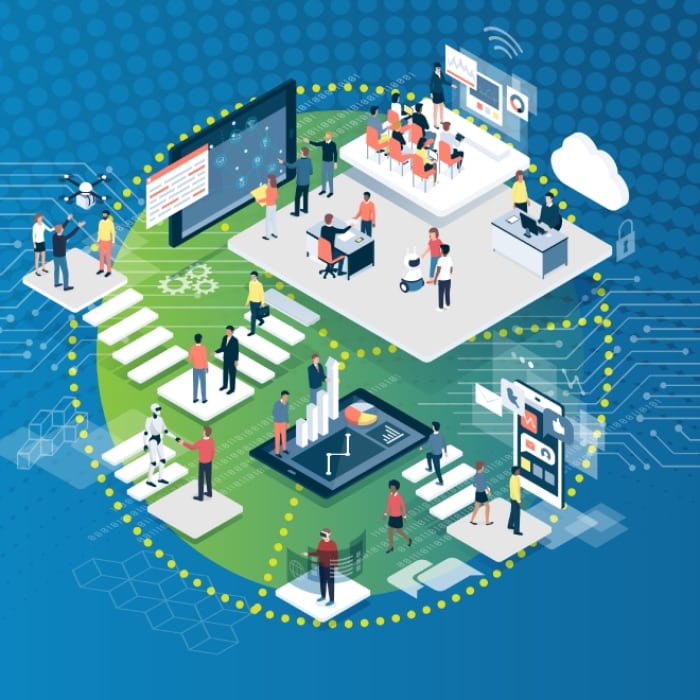
This image is property of www2.deloitte.com.
Big Data Analytics Jobs
Big Data Engineer
Big Data Engineers are responsible for designing and implementing the infrastructure and systems required to process and analyze large volumes of data. They utilize technologies like Apache Hadoop, Spark, and distributed storage systems to build scalable data processing pipelines. Big Data Engineers work closely with data scientists and analysts to ensure data availability and performance. Proficiency in programming languages like Python or Scala, as well as knowledge of big data frameworks and database systems, is crucial for success in this role.
Data Analyst
Data Analysts extract, clean, and analyze data to uncover insights and support decision-making. They utilize techniques such as data visualization, statistical analysis, and predictive modeling to identify trends, patterns, and correlations in large datasets. Data Analysts work closely with stakeholders to understand their requirements and deliver data-driven insights. Proficiency in data analysis tools, programming languages like Python or R, and a strong understanding of statistics is essential for this role.
Data Architect
Data Architects design and oversee the structure and integration of data systems and databases. They define the data models, schemas, and storage mechanisms, ensuring data integrity and performance. Data Architects collaborate with developers, data analysts, and business stakeholders to design efficient data pipelines and implement data governance practices. They possess a strong understanding of database management systems, data integration techniques, and data modeling. Experience with cloud-based data solutions and proficiency in SQL are valuable skills for this role.
Data Mining Specialist
Data Mining Specialists are experts in extracting meaningful patterns and insights from large and complex datasets. They utilize advanced statistical techniques, machine learning algorithms, and data visualization tools to uncover hidden information. Data Mining Specialists work closely with data scientists, analysts, and domain experts to identify opportunities and make data-driven recommendations. Proficiency in data mining and machine learning tools, programming languages like Python or R, and a strong understanding of mathematics and statistics are crucial in this role.
Cybersecurity Jobs
Security Analyst
Security Analysts are responsible for monitoring, detecting, and responding to security incidents and vulnerabilities in computer systems and networks. They utilize security monitoring tools, perform risk assessments, and develop incident response plans. Security Analysts work closely with IT teams to implement security measures, including firewalls, intrusion detection systems, and security protocols. They possess a strong understanding of cybersecurity principles, network protocols, and threat intelligence. Analytical thinking, problem-solving skills, and knowledge of regulatory requirements are important in this role.
Cybersecurity Engineer
Cybersecurity Engineers focus on designing and implementing secure systems and applications. They employ security frameworks, encryption techniques, and access controls to protect sensitive data and prevent unauthorized access. Cybersecurity Engineers collaborate with software developers and network administrators to ensure the integration of security measures into the development and operation of systems. They possess a deep understanding of cybersecurity principles, secure coding practices, and network security. Familiarity with security assessment tools and knowledge of emerging threats and vulnerabilities are important for success in this role.
Penetration Tester
Penetration Testers assess the security of computer systems, networks, and applications by identifying vulnerabilities and attempting to exploit them. They perform ethical hacking activities to identify weaknesses, assess the effectiveness of security measures, and provide recommendations for improvement. Penetration Testers work closely with IT teams to implement patches and security updates based on their findings. They possess a strong knowledge of network protocols, operating systems, and attack techniques. Analytical thinking, problem-solving skills, and ethical hacking certifications are valuable in this role.
Chief Information Security Officer (CISO)
Chief Information Security Officers (CISOs) are responsible for the overall cybersecurity strategy and implementation within an organization. They develop and enforce security policies, manage security operations, and ensure compliance with regulatory requirements. CISOs work closely with executives and stakeholders to align security initiatives with business objectives. They possess a deep understanding of cybersecurity governance, risk management, and business continuity planning. Strong leadership, communication, and decision-making skills, along with extensive experience in cybersecurity, are essential for this role.
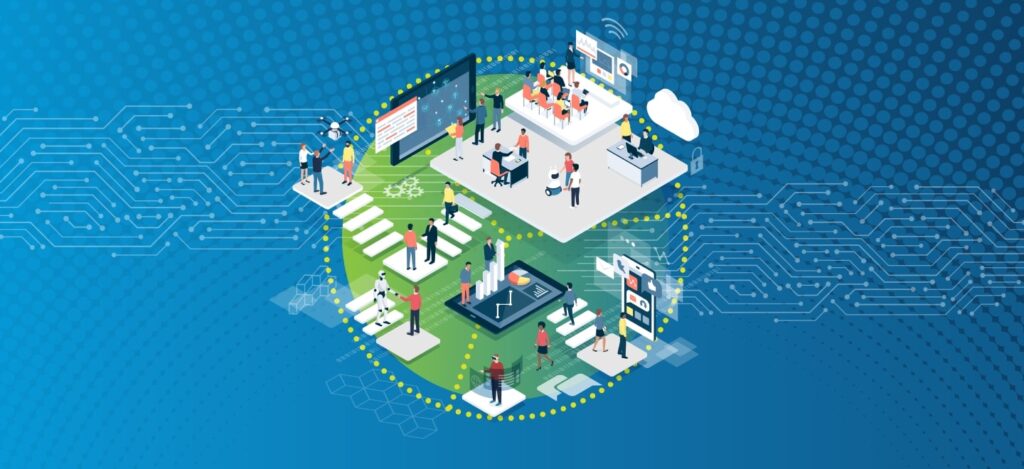
This image is property of www2.deloitte.com.
Robotics Jobs
Robotics Engineer
Robotics Engineers design, develop, and oversee the creation of robotic systems and components. They utilize engineering and programming skills to develop algorithms, design mechanical structures, and integrate sensors and actuators. Robotics Engineers collaborate with cross-functional teams to build robots for various applications, such as manufacturing, healthcare, and exploration. They possess a strong understanding of robotics principles, control systems, and programming languages. Problem-solving skills and the ability to work effectively in a team are crucial for success in this role.
Robotics Technician
Robotics Technicians provide technical support and maintenance for robotic systems. They install, troubleshoot, and repair robots, ensuring their optimal performance. Robotics Technicians work closely with Robotics Engineers to test and calibrate robot components, assist in the assembly process, and conduct routine inspections. They possess a strong understanding of robotic systems, electrical and mechanical principles, and programming languages. Attention to detail, technical acumen, and problem-solving skills are important for this role.
Robotics Programmer
Robotics Programmers develop the software code that controls the behavior and functionality of robots. They utilize programming languages like C++, Python, or ROS (Robot Operating System) to create algorithms, control interfaces, and autonomous behavior for robots. Robotics Programmers work closely with Robotics Engineers to define the software requirements and integrate software components into robotic systems. They possess a strong understanding of software development principles, control systems, and real-time programming. Problem-solving skills and the ability to work in a dynamic environment are important for success in this role.
Robotics Researcher
Robotics Researchers focus on advancing the field of robotics by conducting research and developing innovative solutions. They explore new algorithms, hardware designs, and application areas for robotics technology. Robotics Researchers work closely with academic institutions, industry partners, and other researchers to publish findings and contribute to the scientific community. They possess a strong understanding of robotics principles, programming languages, and research methodologies. Creativity, critical thinking, and a passion for exploration are important traits for success in this role.
Genetic Engineering Jobs
Genetic Engineer
Genetic Engineers utilize molecular biology techniques to manipulate and modify the genetic material of living organisms. They design and conduct experiments, analyze data, and develop new methods to modify DNA sequences. Genetic Engineers work in various fields, including agriculture, pharmaceuticals, and biotechnology, to develop new products and therapies. They possess a strong understanding of genetic engineering principles, molecular biology techniques, and bioinformatics. Attention to detail, critical thinking, and knowledge of ethical considerations are important in this role.
Bioinformatician
Bioinformaticians analyze and interpret biological data using computational tools and techniques. They develop algorithms, design databases, and perform statistical analyses to uncover patterns and meaningful insights from large biological datasets. Bioinformaticians collaborate with geneticists, biologists, and other researchers to advance scientific knowledge. They possess a strong understanding of genetics, statistics, and programming languages like Python or R. Proficiency in bioinformatics tools and databases is crucial for success in this role.
Genetic Counselor
Genetic Counselors provide guidance and support to individuals and families who may have genetic conditions or concerns. They assess genetic risks, interpret genetic test results, and provide information and counseling regarding potential outcomes. Genetic Counselors work closely with healthcare professionals, such as geneticists and obstetricians, to ensure informed decision-making and personalized care. They possess a strong understanding of genetics, counseling techniques, and ethical considerations. Excellent communication skills, empathy, and the ability to work with sensitive information are important in this role.
Gene Therapist
Gene Therapists develop and implement therapies that utilize genetic engineering techniques to treat genetic disorders. They design and deliver therapeutic genes to target cells or tissues, aiming to correct or replace defective genes. Gene Therapists work in research institutions, hospitals, or pharmaceutical companies to develop and apply gene therapy techniques. They possess a strong understanding of genetics, molecular biology, and gene delivery methods. Creativity, problem-solving skills, and a passion for improving healthcare through innovative therapies are important in this role.
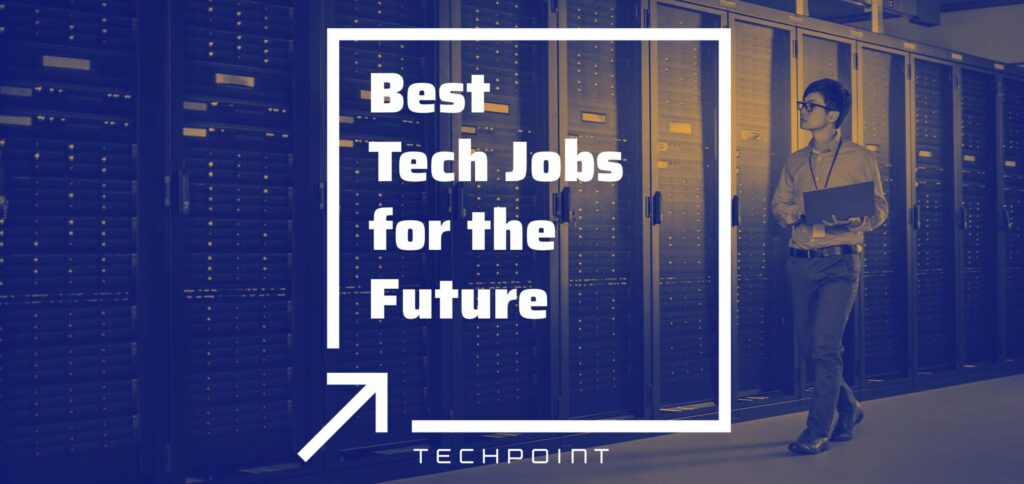
This image is property of techpoint.org.
Renewable Energy Technology Jobs
Solar Energy Engineer
Solar Energy Engineers are responsible for designing and implementing solar energy systems. They assess energy requirements, design photovoltaic systems, and oversee the installation process. Solar Energy Engineers work closely with construction teams and electrical engineers to ensure the optimal performance of solar energy systems. They possess a strong understanding of solar energy technologies, electrical systems, and environmental regulations. Analytical thinking, problem-solving skills, and knowledge of renewable energy incentives are important for success in this role.
Wind Energy Technician
Wind Energy Technicians install, maintain, and repair wind turbines and associated equipment. They perform routine inspections, troubleshoot issues, and ensure the efficient operation of wind energy systems. Wind Energy Technicians work in remote and often challenging environments to perform maintenance and repairs on wind turbines. They possess a strong understanding of wind energy technology, mechanical systems, and electrical principles. Technical skills, attention to detail, and the ability to work at heights are important in this role.
Biofuel Plant Manager
Biofuel Plant Managers oversee the operation and management of biofuel production facilities. They ensure compliance with environmental regulations, oversee production processes, and manage the day-to-day operations of the plant. Biofuel Plant Managers work closely with engineers, technicians, and quality control teams to optimize biofuel production and ensure product quality. They possess a strong understanding of biofuel production techniques, safety regulations, and plant management principles. Leadership skills, problem-solving abilities, and knowledge of renewable energy markets are crucial in this role.
Hydroelectric Power Systems Engineer
Hydroelectric Power Systems Engineers design, develop, and oversee the construction of hydroelectric power generation systems. They assess potential sites, design dam structures, and develop systems to convert hydraulic energy into electrical energy. Hydroelectric Power Systems Engineers collaborate with environmental experts, civil engineers, and electricians to ensure the efficient operation and maintenance of hydroelectric power plants. They possess a strong understanding of hydraulic systems, electrical engineering principles, and environmental impact assessment. Problem-solving skills, attention to detail, and the ability to work on complex projects are important in this role.
Cloud Computing Jobs
Cloud Architect
Cloud Architects are responsible for designing and implementing cloud computing solutions for organizations. They assess business requirements, design cloud architectures, and develop migration strategies. Cloud Architects work closely with stakeholders to ensure the scalability, security, and cost-effectiveness of cloud solutions. They possess a strong understanding of cloud computing principles, virtualization technologies, and knowledge of cloud platforms like Amazon Web Services (AWS) or Microsoft Azure. Analytical thinking, problem-solving skills, and the ability to work with multidisciplinary teams are important in this role.
Cloud Engineer
Cloud Engineers develop and maintain the infrastructure and systems required to support cloud computing environments. They configure virtual machines, set up storage systems, and manage cloud networks. Cloud Engineers work closely with software developers, database administrators, and security specialists to ensure the availability and performance of cloud-based applications. They possess a strong understanding of networking principles, virtualization technologies, and cloud computing platforms. Proficiency in scripting languages like Python or PowerShell is valuable in this role.
Cloud Consultant
Cloud Consultants provide expert advice and guidance on the adoption and implementation of cloud computing solutions. They assess business requirements, evaluate cloud service providers, and develop cloud migration strategies. Cloud Consultants work closely with stakeholders to ensure the alignment of cloud solutions with business objectives. They possess a deep understanding of cloud computing principles, industry trends, and regulatory considerations. Strong communication, problem-solving, and presentation skills, along with experience in cloud architecture, are important for success in this role.
Cloud Security Specialist
Cloud Security Specialists focus on ensuring the security and privacy of data and systems in cloud computing environments. They assess vulnerabilities, implement access controls, and monitor for security incidents. Cloud Security Specialists work closely with cloud providers, network administrators, and cybersecurity teams to implement security measures and enforce compliance with regulatory requirements. They possess a strong understanding of cloud security principles, encryption techniques, and identity and access management (IAM) policies. Analytical thinking, problem-solving skills, and the ability to stay up to date with emerging cloud security threats are important in this role.
With the rapid advancement of technology, innovative job opportunities abound. Whether you are interested in artificial intelligence, virtual reality, blockchain, or any other emerging field, there are a plethora of exciting and rewarding careers to explore. Each sector offers unique roles, each with its own set of skills and responsibilities.
Artificial intelligence jobs encompass a range of positions. AI Software Developers are responsible for creating the software applications that power artificial intelligence, while Machine Learning Engineers focus on developing algorithms that enable machines to learn and improve. Data Scientists analyze large datasets to extract valuable insights, and Algorithm Specialists design and optimize algorithms to solve complex problems.
Virtual reality (VR) and augmented reality (AR) jobs offer opportunities to create immersive experiences. VR/AR Content Creators combine artistic and technical skills to design interactive environments. VR/AR Developers build the software applications that power these experiences, and VR/AR Designers focus on creating visually appealing and user-friendly interfaces. VR/AR Ethicists ensure ethical considerations are taken into account during development.
Blockchain jobs revolve around the revolutionary technology that underlies cryptocurrencies like Bitcoin. Blockchain Developers create and implement blockchain solutions, while Blockchain Architects design the architecture of blockchain systems. Blockchain Analysts analyze blockchain data for insights, and Blockchain Consultants provide guidance on adopting blockchain technology.
The Internet of Things (IoT) connects devices and systems to create a network of interconnected objects. IoT Developers build software applications for connected devices, while IoT Security Specialists focus on ensuring the security of IoT systems. IoT Data Analysts extract insights from IoT data, and IoT Solutions Architects design the architecture of complex IoT systems.
In the field of big data analytics, professionals extract insights from vast amounts of data. Big Data Engineers build the infrastructure required to process and analyze large datasets, while Data Analysts perform analysis and visualization to identify trends and patterns. Data Architects design the structure of data systems, and Data Mining Specialists utilize advanced techniques to discover hidden information.
Cybersecurity jobs play a critical role in protecting systems and networks from cyber threats. Security Analysts monitor and respond to security incidents, while Cybersecurity Engineers design and implement secure systems. Penetration Testers assess the security of systems by attempting to exploit vulnerabilities, and Chief Information Security Officers (CISOs) oversee the overall cybersecurity strategy of organizations.
Robotics jobs involve designing, developing, and operating robotic systems. Robotics Engineers create algorithms and integrate sensors and actuators, while Robotics Technicians provide technical support. Robotics Programmers develop the software code that controls robots, and Robotics Researchers explore new advancements in robotics technology.
Genetic engineering jobs focus on manipulating genetic material for various purposes. Genetic Engineers modify DNA sequences, while Bioinformaticians analyze biological data using computational techniques. Genetic Counselors provide guidance to individuals and families regarding genetic conditions, and Gene Therapists develop therapies utilizing genetic engineering techniques.
Renewable energy technology jobs contribute to the development of sustainable energy sources. Solar Energy Engineers design and implement solar energy systems, while Wind Energy Technicians maintain and repair wind turbines. Biofuel Plant Managers oversee the production of biofuels, and Hydroelectric Power Systems Engineers design and oversee the construction of hydroelectric power generation systems.
Cloud computing jobs revolve around the deployment and management of cloud-based systems. Cloud Architects design cloud solutions, while Cloud Engineers develop and maintain cloud infrastructure. Cloud Consultants provide guidance on adopting cloud technology, and Cloud Security Specialists ensure the security of cloud environments.
With the diverse range of innovative technology jobs available, individuals can find exciting and rewarding careers that align with their interests and skills. By understanding the roles and responsibilities within each field, you can embark on a path that allows you to contribute to the advancement of technology and shape the future of innovative industries. So, discover which field piques your curiosity, acquire the necessary skills, and prepare for a fascinating and fulfilling career in innovative technology.
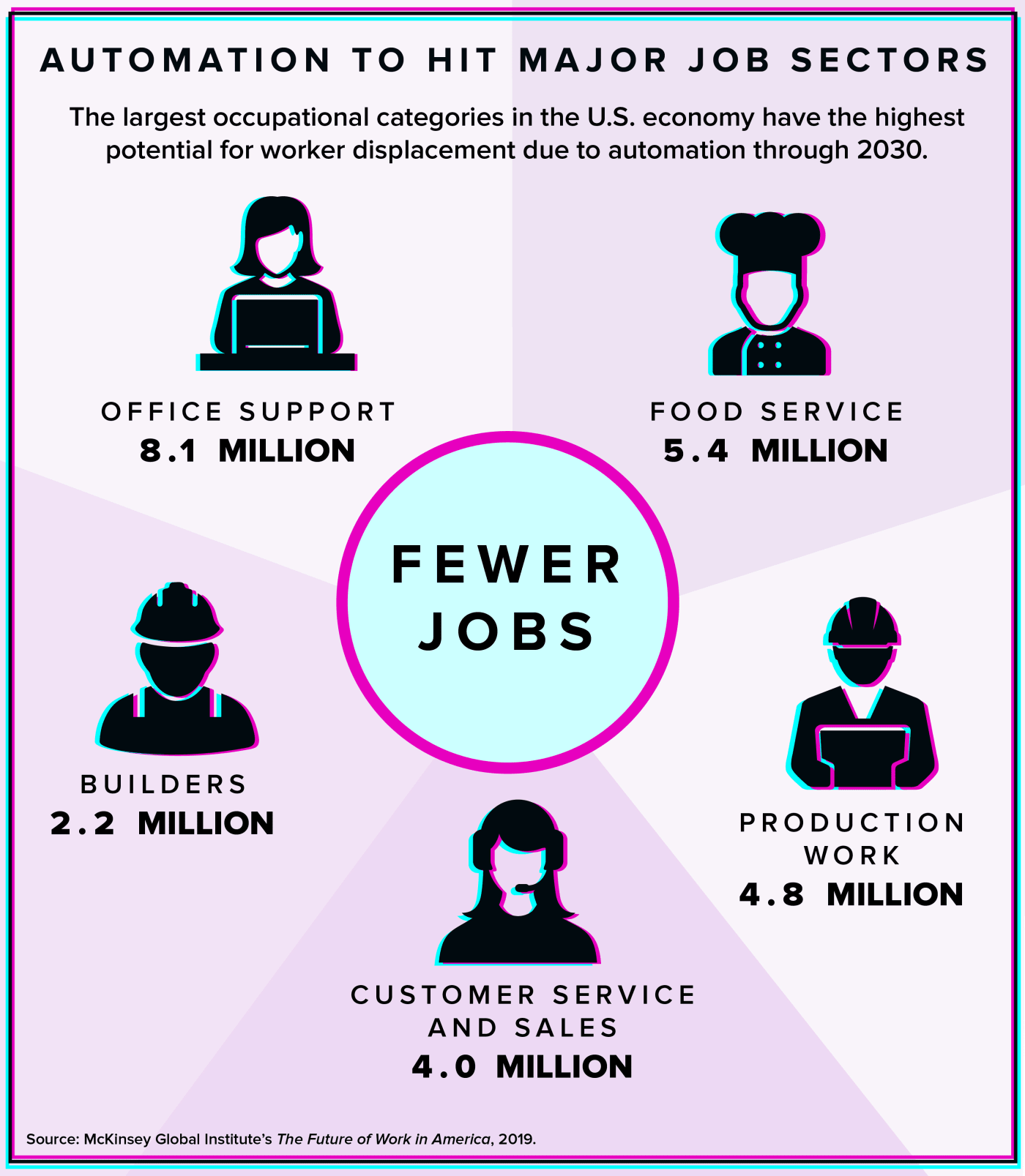
This image is property of cdn.shrm.org.
